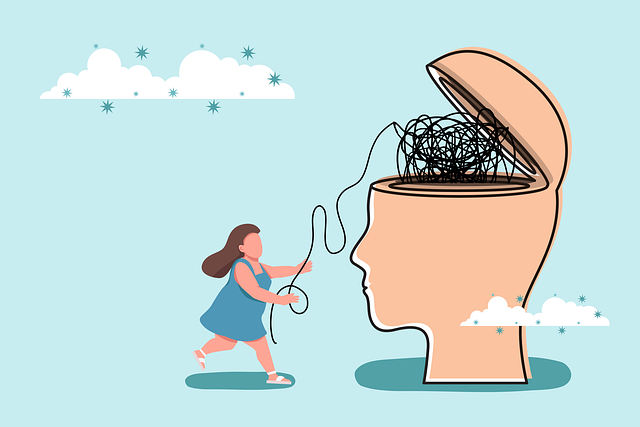Burnout among healthcare providers, particularly those offering specialized services like Lakewood ADD-ADHD Therapy, is a pressing issue with significant implications. High-stress work environments contribute to exhaustion, cynicism, and decreased patient care quality. To combat this crisis, a multi-faceted approach is required, focusing on emotional well-being promotion, stigma reduction, and cultural sensitivity in mental healthcare. Lakewood ADD-ADHD therapy provides a supportive environment for managing symptoms through evidence-based practices, leading to improved relationships, academic/professional success, and long-term mental health resilience. Strategies like self-care practices, professional development, and tailored communication can prevent burnout and enhance patient outcomes, ensuring healthcare providers, including those specializing in Lakewood ADD-ADHD Therapy, stay motivated and effective.
Healthcare provider burnout is a growing concern, with significant implications for both practitioners and patients. This article explores effective prevention strategies, drawing insights from Lakewood ADD-ADHD Therapy’s successful approach. We delve into understanding burnout’s root causes and its impact on healthcare providers, followed by practical steps like fostering supportive work environments, implementing self-care practices, encouraging professional development, and enhancing patient-provider relationships to mitigate burnout.
- Understanding Burnout: Causes and Impact on Healthcare Providers
- Fostering a Supportive Work Environment at Lakewood ADD-ADHD Therapy
- Implementing Self-Care Practices for Long-Term Sustainability
- Professional Development and Ongoing Training as Preventative Measures
- Enhancing Patient-Provider Relationships to Reduce Burnout
Understanding Burnout: Causes and Impact on Healthcare Providers

Burnout among healthcare providers is a growing concern, impacting not only individual practitioners but also patient care and overall healthcare outcomes. It is essential to recognize that burnout goes beyond mere job dissatisfaction; it is a complex state resulting from prolonged exposure to stressful work environments. Healthcare professionals, particularly those in demanding specialties like Lakewood ADD-ADHD Therapy, often face high workloads, long hours, and intense emotional demands. These factors contribute to feelings of exhaustion, cynicism, and detachment from work.
The consequences of burnout are significant. It can lead to decreased productivity, increased errors, and even physical health issues. Moreover, it negatively affects patients, as burned-out providers may struggle to deliver compassionate and effective care. Addressing this issue requires a multi-faceted approach focusing on Emotional Well-being Promotion Techniques, Mental Illness Stigma Reduction Efforts, and Cultural Sensitivity in Mental Healthcare Practice. These strategies aim to create supportive work environments, encourage self-care, foster open conversations about mental health, and ensure diverse and inclusive practices that cater to the unique needs of patients.
Fostering a Supportive Work Environment at Lakewood ADD-ADHD Therapy

Implementing Self-Care Practices for Long-Term Sustainability

In the high-pressure environment of healthcare, burnout is a persistent concern for providers. One effective strategy to combat this issue lies in prioritizing self-care practices. By incorporating regular relaxation techniques, such as mindfulness meditation or yoga, healthcare professionals can reduce stress levels and maintain resilience. Additionally, engaging in physical exercise, maintaining a balanced diet, and ensuring adequate sleep are essential components of self-care that contribute to long-term sustainability. These practices not only enhance overall well-being but also foster better coping mechanisms, enabling providers to effectively manage challenging situations, including those related to ADD/ADHD in the case of Lakewood ADD-ADHD Therapy.
Furthermore, self-care is integral to sustainable career performance and can be seen as a form of risk management planning for mental health professionals. By nurturing their mental health through these practices, healthcare providers can improve their ability to cope with work-related stressors, leading to better patient care and job satisfaction. This proactive approach ensures that professionals remain engaged, compassionate, and effective in their roles, ultimately benefiting both their personal lives and the communities they serve.
Professional Development and Ongoing Training as Preventative Measures

Healthcare provider burnout is a growing concern, but strategies such as Professional Development and Ongoing Training can serve as effective preventative measures. By investing in continuous education, healthcare professionals can stay updated with the latest research, techniques, and best practices in their field. This not only enhances their clinical skills but also boosts job satisfaction and resilience against stress. For instance, a mental health practitioner specializing in Lakewood ADD-ADHD Therapy can benefit from regular workshops or online courses that delve into emerging therapies and treatment modalities, ensuring they offer the most effective care to their patients.
Incorporating Self-Care Routine Development for Better Mental Health is integral to these training programs. Healthcare providers are encouraged to prioritize their own mental wellness through practices like mindfulness, exercise, and adequate sleep. This holistic approach extends beyond professional development; it encompasses advocating for Mental Health Policy Analysis and Advocacy, ensuring that healthcare systems themselves promote and support staff well-being. By fostering a culture of care within the profession, these strategies contribute to long-term sustainability in the sector.
Enhancing Patient-Provider Relationships to Reduce Burnout

Building strong patient-provider relationships can significantly mitigate healthcare provider burnout. When patients feel heard, respected, and valued, it fosters a sense of connection that improves job satisfaction for healthcare professionals. This is particularly important in communities like Lakewood, where diverse populations may require specialized care, such as Lakewood ADD-ADHD Therapy, to address unique needs. Tailoring communication styles to accommodate cultural differences and providing empathetic support can enhance these relationships, reducing the emotional strain on providers.
Furthermore, encouraging open dialogue and active listening ensures that patients’ concerns are addressed effectively. This not only improves patient outcomes but also contributes to a more positive work environment. By fostering confidence-boosting interactions and social skills training, healthcare providers can build resilience against burnout while enhancing their ability to connect with patients from different backgrounds, including those seeking Lakewood ADD-ADHD Therapy services.
In conclusion, healthcare provider burnout is a complex issue demanding multifaceted solutions. From cultivating supportive work environments at institutions like Lakewood ADD-ADHD Therapy, to empowering professionals with self-care practices and continuous training, each strategy plays a vital role in preventing burnout. Fostering strong patient-provider relationships further reduces stress levels, creating a more sustainable and rewarding healthcare ecosystem. By implementing these strategies, we can ensure healthcare providers remain dedicated and resilient, ultimately benefiting both patients and the industry as a whole.














